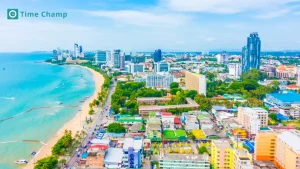The average salary in Indonesia in 2024 is 12,200,000 IDR which is approximately 767.11 USD according to Salary Explorer.
Indonesia is one of the largest economies in Southeast Asia, and a country made up of thousands of islands. As its economy grows, businesses and job seekers want to know the average salary in Indonesia, and its latest economic trends.
This blog will help you find out about average salaries in Indonesia, minimum and maximum wages, salary ranges, high-paying jobs, as well as economic growth analysis in 2024.
Average Salary in Indonesia
According to Salary Explorer, the average monthly salary in Indonesia in 2024 is 12,200,000 IDR which is around 767.11 USD.
The average annual salary in Indonesia in 2024 is 146,000,000 IDR which is nearly 9180.17 USD.
The average hourly wage in Indonesia in 2024 is 70,300 IDR which is equivalent to 4.42 USD.
Minimum Wage in Indonesia
According to the Cabinet Secretariat of the Republic of Indonesia, in 2024, Indonesia is preparing for a significant adjustment to its national minimum wage, with an average increase of 6.5% set to take effect in 2025.
President Prabowo Subianto shared this news after a meeting about the economy and helping workers. The raise is higher than what the work minister first suggested, which was 6%. The goal is to help workers buy more things while also being fair to businesses.
The minimum wage is set by each province and district according to the local economic conditions. This means workers in different parts of Indonesia might earn different minimum salaries depending on the cost of living and economic situation in their specific area.
| Province | Minimum Wage Rate per Month in IDR | Minimum Wage Rate per Month in USD |
|---|---|---|
|
Aceh
|
3,460,672
|
217.60
|
|
North
Sumatra
|
2,809,915
|
176.68
|
|
West
Sumatra
|
2,811,449
|
176.78
|
|
Riau
|
3,294,625
|
207.16
|
|
Jambi
|
3,037,121
|
190.97
|
|
Bangka
Belitung
|
3,640,000
|
228.88
|
|
Lampung
|
2,716,497
|
170.81
|
Source: ASEAN Briefing
Indonesia Median Income
The median salary of a person in Indonesia in 2024 is nearly 136,800,100 IDR which is equivalent to 8601.70 USD according to the World Salaries data. Median salary is the middle point of all salaries within a country, i.e. half of the workers earn more than it, and half earn less than it. You can understand the true economic condition of workers in Indonesia, by focusing on the median salary and cutting through the extremes of very high or very low incomes in that country.
Maximum Salary in Indonesia
The maximum salary in Indonesia in 2024 is 54,200,000 IDR which is around 3407.98 USD according to the Salary Explorer. This figure indicates the highest earning potential of highly skilled professionals and experienced workers in the country. The maximum salary can range widely from one industry to another, job role to job role, and from one level of expertise to another. These premium salaries are influenced by factors, such as education, professional experience, industry sector as well as company size.
Salary Ranges in Indonesia
How much money people can earn in Indonesia will vary depending on where they work, their skill, and their experience. In 2024, workers in Indonesia can expect to make an average of 36,841,600 IDR (2316.52 USD) to 650,401,500 IDR (40895.85 USD) per year, according to the World Salaries data.
This salary range shows that Indonesia has many types of jobs with different pay levels. For instance, entry-level jobs typically pay a bit closer to the lower end; senior or specialized field jobs pay more closer to the higher end in the salary range in Indonesia.
Factors Influencing Average Salaries in Indonesia in 2024
The average salary in Indonesia varies based on various factors. Below are the average monthly salaries in Indonesia in 2024 based on factors such as profession and location.
Indonesia Average Salary by Profession
Understanding how much people earn in different jobs can help you learn about work and money in Indonesia. Here’s a look at what workers make in various fields:
| Profession | Average Monthly Salary in Indonesia in IDR | Average Monthly Salary in Indonesia in USD |
|---|---|---|
|
Accountant
|
9,160,000
|
575.96
|
|
Office
Manager
|
10,800,000
|
679.08
|
|
Graphic
Designer
|
8,010,000
|
503.65
|
|
Human
Resources
Manager
|
19,000,000
|
1194.68
|
|
Business
Development
Manager
|
19,900,000
|
1251.27
|
|
General
Manager
|
21,500,000
|
1351.87
|
|
Developer
/
Programmer
|
12,800,000
|
804.84
|
Source: Salary Explorer
Average Salary in Indonesia by City
The average salary in Indonesia varies significantly across different cities, reflecting the economic landscape and cost of living in each area. Below table shows the average monthly salaries in several major cities, represented in both Indonesian Rupiah (IDR) and U.S. dollars (USD).
| City | Indonesia Average Salary in IDR per Month | Indonesia Average Salary in USD per Month |
|---|---|---|
|
Bandung
|
13,400,000
|
842.56
|
|
Jakarta
|
13,900,000
|
874.00
|
|
Makassar
|
12,200,000
|
767.11
|
|
Malang
|
12,000,000
|
754.53
|
|
Medan
|
13,200,000
|
829.99
|
|
Surakarta
|
11,800,000
|
741.96
|
|
Tangerang
|
13,000,000
|
817.41
|
Source: Salary Explorer
Salary Comparisons in Indonesia in 2024
Let’s take a look at salary comparisons in Indonesia based on education and experience.
Salary Comparison in Indonesia Based on Education
In Indonesia, how much a person earns can also depend on their education level. Here’s a simple look at how salaries increase based on different qualifications:
| Education Level | Percentage Increase in Salary Compared to Previous Year |
|---|---|
|
Diploma
|
+17%
|
|
Bachelor’s
Degree
|
+24%
|
|
Master’s
Degree
|
+29%
|
|
PhD
|
+23%
|
Source: Salary Explorer
Salary Comparison in Indonesia Based on Experience
In Indonesia, how much a person earns can change a lot based on their work experience. Here is a simple overview of salary increases based on different experience levels:
| Experience Level | Percentage Increase in Salary Compared to Previous Year |
|---|---|
|
2 to 5
Years
|
+32%
|
|
5 to 10
Years
|
+36%
|
|
Over 10
Years
|
+21%
|
|
Over 15
Years
|
+14%
|
Source: Salary Explorer
Cost of Living in Indonesia in 2024
According to the Numbeo survey, the cost of living in Indonesia is shown below:
Accommodation Expenses
- A 1-bedroom apartment in the city center costs 4,671,853 IDR (293.76 USD) per month
- A 1-bedroom apartment outside the city center costs 2,771,626 IDR (174.27 USD) per month
- A 3-bedroom apartment in the city center costs 12,330,426 IDR (775.3 USD) per month
Grocery Costs
- 1 liter of milk costs 20,514 IDR (1.29 USD)
- 500g loaf bread costs 18,917 IDR (1.19 USD)
- 1 kg white rice costs 14,262 IDR (0.90 USD)
- 12 eggs costs 25,361 IDR (1.59 USD)
- 1 kg chicken fillet costs 53,248 IDR (3.35 USD)
- 1 kg beef costs 128,217 IDR (8.06 USD)
Transportation Costs
- One-way local transport ticket costs nearly 5,000 IDR (0.31 USD)
- Monthly public transport pass costs 150,000 IDR (9.43 USD) per month
- Taxi start fare costs around 9,500 IDR (0.60 USD).
The Key Advantages of Outsourcing to Indonesia
Let’s take a look at how outsourcing to Indonesia benefits businesses:
Reduces Labour Costs
Worker wages are much cheaper in Indonesia compared to many other countries. According to a report by the World Bank Indonesia Jobs Report, lower wages allow businesses to maintain skilled workers without spending too much, making Indonesia an attractive location for outsourcing operations. It’s a smart choice for businesses that want to save money getting quality work done at a much cheaper price.
Tax Benefits
According to the Indonesia Incorp, Indonesia is improving its tax rules to attract both foreign and local investment, giving businesses great chances to grow. The newest changes to the tax holiday rules offer better benefits, including bigger tax cuts and longer periods for investors. These tax breaks help businesses work in Indonesia easier and cheaper. A supportive tax environment helps both local and international companies benefit from a win-win situation.
Rapid Economic Growth
Each year Indonesia’s economy gets stronger. Indonesia’s economy is experiencing rapid growth, with a reported increase of 5.11% in the first quarter of 2024 compared to the same period last year. The steady growth of the country means it’s becoming a more reliable and promising place for businesses to expand and work with local teams. The consistent economic progress is a stable and promising market for long-term business investments.
Low Operating and Living Costs
Everything is cheaper in Indonesia than in any Western country. Here businesses can spend much less money on office space and everyday living costs. This allows companies to use their money more effectively, and save a lot. The country’s low-cost environment gives businesses a huge competitive edge.
Boost Your Remote Team’s Productivity Using Time Champ
Tracking the productivity of remote teams is essential for businesses that want to improve their work results. Without proper tracking, it’s difficult to see how team members are spending their work hours, which makes it challenging to measure performance and improve productivity.
Whether you are outsourcing to Indonesia or other countries, Time Champhelps you enhance your employees’ productivity and understand their performance better.
Time Champ tracks employee productivity efficiently by tracking their hours automatically and provides detailed productive activity reports breaking into productive time, unproductive time and neutral time. These reports help businesses to monitor and improve employees’ performance effortlessly.
Time Champ offers comprehensive project management feature which helps to manage projects and tasks effectively. Time Champ helps businesses completing projects within deadlines and managing workflows easily. Budget tracking also becomes easy using Time Champ.
Businesses want to monitor remote employees to boost their productivity and achieve better results. Time Champ effectively monitor employees’ capturing screenshots, screen recordings and offering live screen monitoring. Time Champ generates automatic Timesheets based on the hours employees spend on their tasks simplifying the payroll process.
Ready to boost your remote team’s productivity ?
Sign up for Time Champ and discover the benefits of effective productivity tracking!
Signup for FreeBook DemoFinal Words
To conclude, Indonesia has always been an appealing outsourcing destination because of its competitive average salary, fast economic growth, and cheap labour costs. If you wish to grow your business or recruit in this growing market, you must know about salaries in Indonesia. Average salaries also tell you that the economy of Indonesia is strong and the workers are well competent as they can help companies get better results.
Frequently Asked Questions
Industries such as oil and gas, finance, technology, and healthcare offer the highest salaries in Indonesia. For instance, tech roles such as software engineers and data scientists are in high demand, commanding competitive pay packages. Senior management positions in multinational companies also offer higher salaries.
Yes, salaries in Indonesia are subject to income tax. Employees are required to pay taxes based on a progressive tax system, where rates range depending on their income level. Employers often deduct these taxes directly from monthly salaries and submit them to the government.
Many employers in Indonesia provide additional benefits and allowances beyond the base salary. Common examples include health insurance, housing or transportation allowances, and bonuses. These benefits can add significant value to an employee’s total compensation package.
Expats often earn higher salaries than local employees, particularly in managerial or specialized technical roles. This difference is due to the added costs of relocation, housing allowances, and specific expertise that expats bring.







